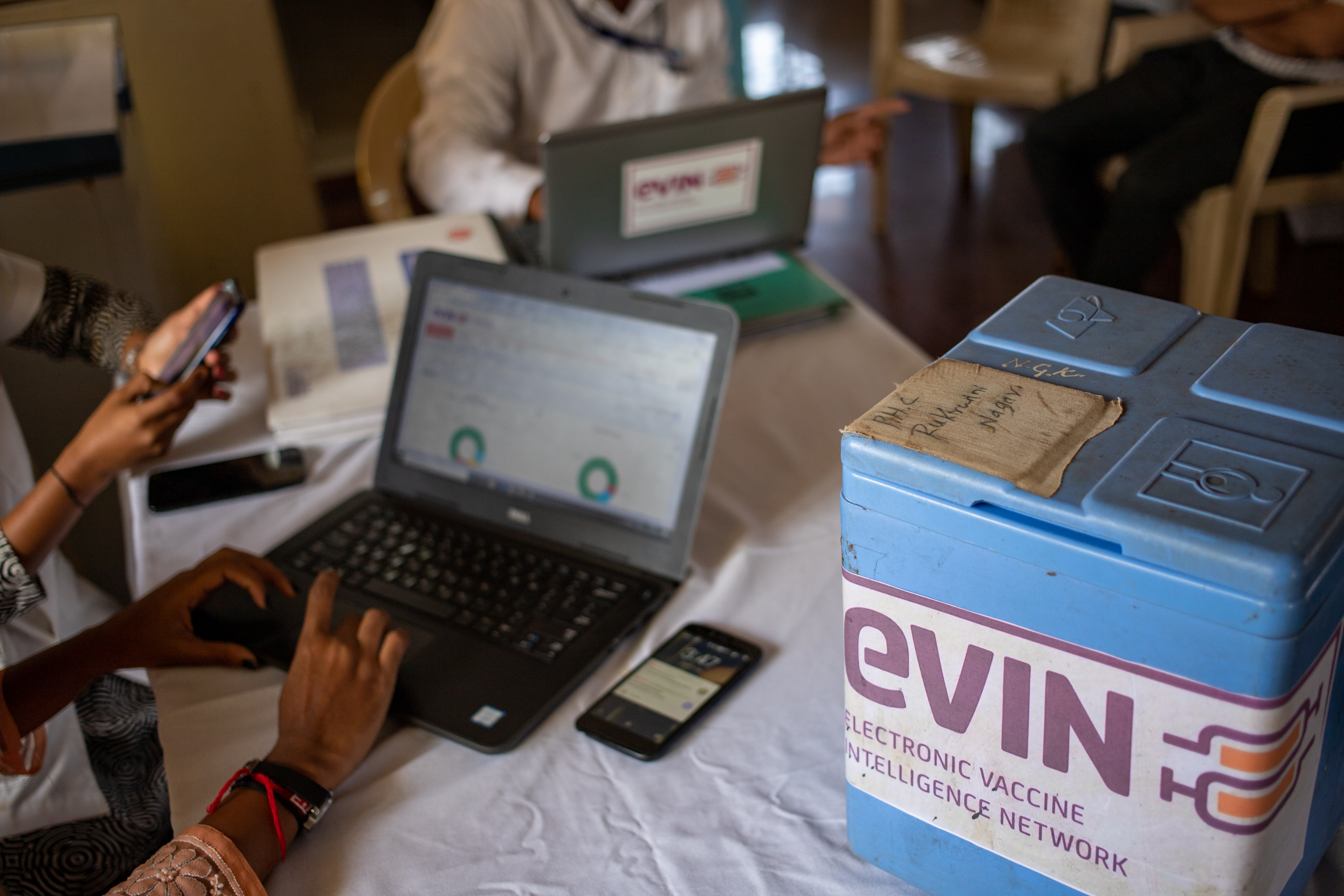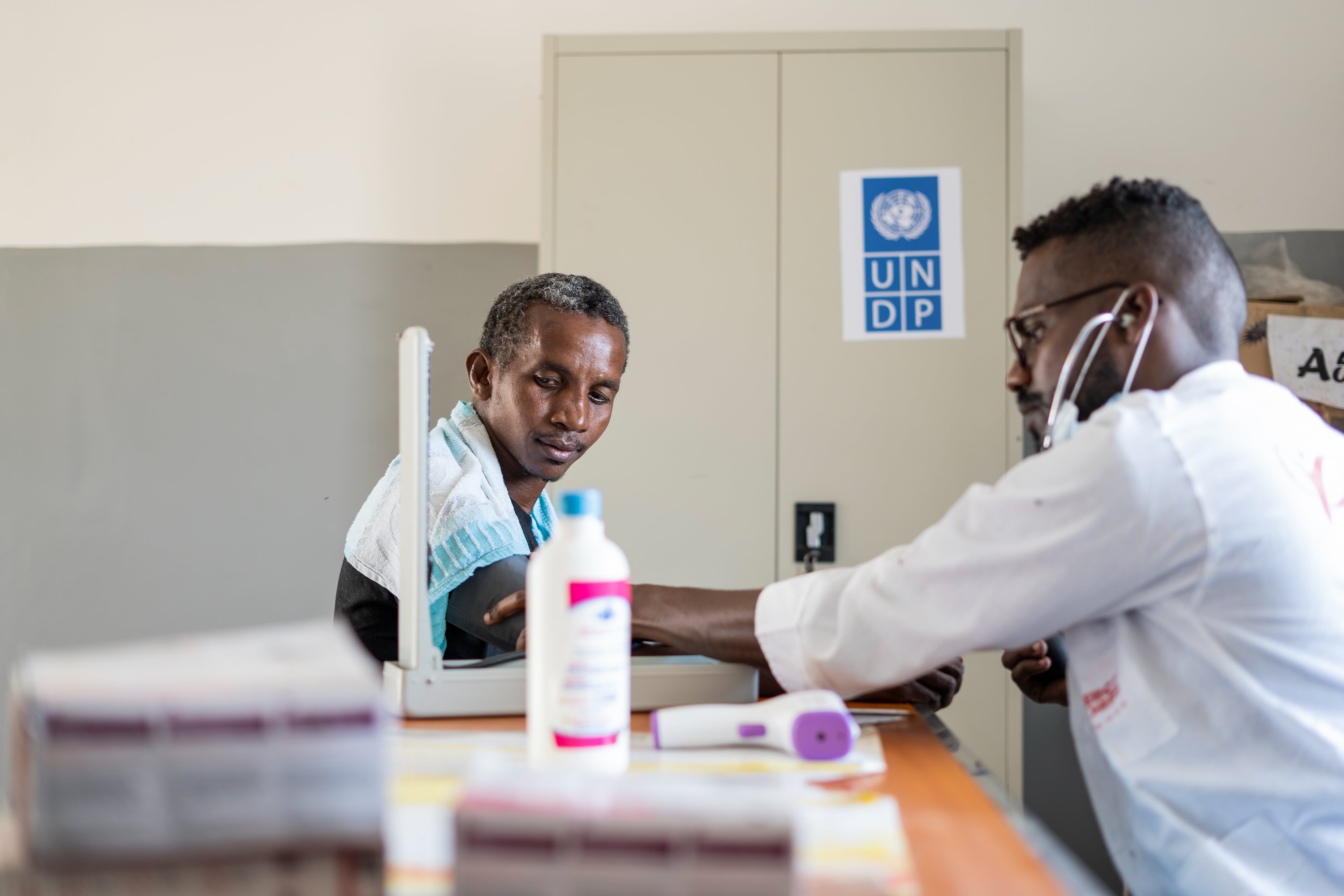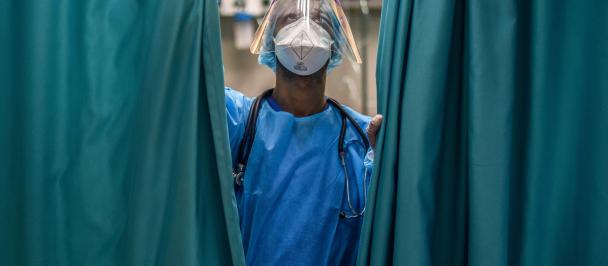The path to health for all amidst a changing climate and legal landscape
The right environment for health
April 5, 2024

In India the Electronic Vaccine Intelligence Network (eVIN) is a smartphone app that digitizes information on vaccine stocks and temperatures.
This year, World Health Day is dedicated to ‘my health, my right’ – the fundamental right to health. The path to achieving this for everyone, everywhere, hinges on protecting both the natural and legal environments.
But both are under threat. Despite being enshrined in the constitutions of at least 140 countries, the right to health remains out of reach for too many.
Today, 3.6 billion people are living in areas highly vulnerable to climate change, which could lead to 14.5 million deaths a year by 2050. Climate-driven natural disasters are displacing populations and jeopardizing food security and access to clean water. Rising temperatures are spreading vector-borne diseases to new regions and increasing the risk of noncommunicable diseases. Air quality is deteriorating, with 124 out of 134 countries and territories exceeding the World Health Organization’s standards for particulate matter pollution. Air, soil and water pollution account for an estimated nine million annual premature deaths, 90 percent of which occur in low- and middle-income countries.
Legal and policy environments that should protect the right to health are under attack. Evidence and rights-based legal and policy environments lead to better health, especially for the most marginalized. However, progress is being undermined by violent conflicts, like those in Gaza and Ukraine that are severely straining health systems and worsening inequalities, a resurgence of anti-LGBTQI+ laws, persecution of already vulnerable populations and tightening restrictions on the right to health for women and girls.
These injustices are suffocating the right to health.
We urgently need transformation to safeguard the right environment for health, to fortify our health systems against the changing climate and advance equitable laws and policies that promote health for all. This requires more than words; it demands bold, cooperative action to protect our natural environment and create supportive legal frameworks.
Protecting our natural environment – accelerate solidarity and innovation
At COP28 last year, Member States pledged to move away from fossil fuels, while more than 140 countries endorsed a groundbreaking Declaration on Climate and Health. The Summit of the Future in September 2024 will provide an important forum for Member States to reaffirm their commitments to the health of people and planet across the Agenda 2030 and beyond, ensuring concrete actions and more financial resources. This degree of global solidarity is the bare minimum – increased political will and cooperation is necessary to ensure health is a right for all, not a privilege for some.

Smart Health Facilities in more than a dozen countries are helping to unlock the potential of clean energy and innovative technology to reduce costs, respond better to shocks and crises, and reach more people.
Bridging this gap requires innovation. UNDP works with the Global Fund to Fight AIDS, Tuberculosis and Malaria and Gavi, The Vaccine Alliance, with Smart Health Facilities in more than a dozen countries, helping to unlock the potential of clean energy and innovative technology to reduce costs, respond better to shocks and crises, and reach more people with health services.
As part of this, the Solar for Health initiative is advancing green energy solutions to improve healthcare accessibility while mitigating environmental harm. In Zimbabwe, UNDP and partners have helped install solar power in more than 1,000 health facilities, making quality care more affordable, accessible and environmentally friendly. In South Sudan and Tajikistan, areas with unreliable electricity and high rates of tuberculosis (TB), the power of AI diagnostics is being harnessed to improve access to TB testing in remote communities.
UNDP is also supporting countries, including Ethiopia, India and Mongolia, to develop investment cases that have helped to reveal the economic, health and environmental burden of air pollution. Through this initiative, Ethiopia and Mongolia have proposed legal reforms, and Mongolia has developed a multisectoral plan to address the climate and health crisis.
Legal and policy environments
Laws and policies grounded in evidence and human rights are crucial for protecting the planet and are equally vital for ensuring equitable health services. Empowering everyone with basic healthcare without discrimination is a basic building block of the right environment for health.
This truth is the basis of the historic 10-10-10 HIV targets, which countries committed to as part of the 2021 Political Declaration on HIV and AIDS. Theycall for transformative action to reduce stigma, discrimination and gender-based violence and remove punitive laws and policies impacting people living with HIV and other key populations. But the clock is ticking; no country is on track to meet these targets by 2025.
People living with HIV and key populations are working to change this by leading the charge to tackle discriminatory laws and HIV-related criminalization. Their leadership has delivered results. In 2022, more countries removed punitive same-sex sex laws than in any single year in the past 25.
The power of community leadership is evident. In Kyrgyzstan, the community-led organization The Public Foundation "Plus Centre" is delivering social aid and facilitating the reintegration of people living with HIV into health systems. In India, the Global Alliance for Human Rightsis working with people living with HIV and government agencies to provide legal aid and help enforce protective laws.
More must be done to bolster community leadership and implement laws and policies that enable health and well-being to flourish.
UNDP is supporting communities of people living with and affected by HIV to counter discriminatory laws, policies and HIV-related criminalization around the world, deploying a range of tactics to advance law reform, including awareness campaigns led by transgender and LGBTQI+ organizations. In Africa and the Caribbean, UNDP is working with communities of people living with HIV, key populations, LGBTQI+ groups and governments to promote knowledge sharing, partnerships and accountability to realize the right to health.
‘My health, my right’
We must embrace ‘my health, my right’ as more than a slogan. It is an urgent call to action to protect and build the right environments for health. Communities around the world best understand their needs, issues and opportunities, and the right environment for health can be built by supporting the leadership and work of these communities to confront the climate crisis, fortify health systems and realize their rights. If leaders and partners are responsive to these efforts and commit to prioritizing the right to health across all sectors, we can transform ‘my health, my right’ from a rallying cry into a reality.

 Locations
Locations




